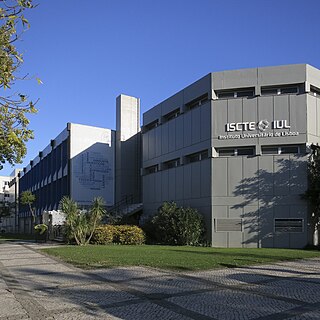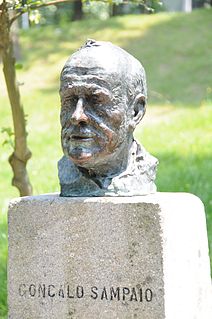
Paulo Renato Rebocho Ferreira, OIH is a Portuguese former footballer who played as a full-back.

The Cinema of Portugal started with the birth of the medium in the late 19th century. Cinema was introduced in Portugal in 1896 with the screening of foreign films and the first Portuguese film was Saída do Pessoal Operário da Fábrica Confiança, made in the same year. The first movie theater opened in 1904 and the first scripted Portuguese film was O Rapto de Uma Actriz (1907). The first all-talking sound film, A Severa, was made in 1931. Starting in 1933, with A Canção de Lisboa, the Golden Age would last the next two decades, with films such as O Pátio das Cantigas (1942) and A Menina da Rádio (1944). Aniki-Bóbó (1942), Manoel de Oliveira's first feature film, marked a milestone, with a realist style predating Italian neorealism by a few years. In the 1950s the industry stagnated. The early 1960s saw the birth of the Cinema Novo movement, showing realism in film, in the vein of Italian neorealism and the French New Wave, with films like Dom Roberto (1962) and Os Verdes Anos (1963). The movement became particularly relevant after the Carnation Revolution of 1974. In 1989, João César Monteiro's Recordações da Casa Amarela won the Silver Lion at the Venice Film Festival and in 2009, João Salaviza's Arena won the Short Film Palme d'Or at the Cannes Film Festival. Several other Portuguese films have been in competition for major film awards like the Palme d'Or and the Golden Bear. João Sete Sete (2006) was the first Portuguese animated feature film. Portuguese cinema is significantly supported by the State, with the government's Instituto do Cinema e do Audiovisual giving films financial support.

The Big Three is the nickname of the three most successful football clubs in Portugal. The teams of S.L. Benfica and Sporting CP, both from Lisbon, and of FC Porto, from Porto, have a great rivalry and are usually the main contenders for the Primeira Liga title. They share all but two of the Portuguese Football Championships ever played, and generally end up sharing the top three positions. None of them have been relegated from the Primeira Liga either, having been participants in all editions since its first season in 1934–35. Benfica's lowest position was 6th in 2000–01, while Porto's 9th place finish in 1969–70 makes the closest any side has come to relegation. Sporting's worst finish was a 7th place finish in 2012–13.

ISCTE – Instituto Universitário de Lisboa is a Portuguese public tertiary education institution. It is located in the city centre of Lisbon, in Cidade Universitária, adjoining the Institute of Social Sciences (ICS) and Institute of Geography and Spatial Planning (IGOT) of the University of Lisbon. ISCTE was formerly called Instituto Superior de Ciências do Trabalho e da Empresa, but its full name was dropped in 2009 when it became a university institute of foundational nature. As of today, ISCTE is widely considered a fully-fledged public research university despite its traditional designation, as reflected in national news coverage of the performance of Portuguese universities internationally and open, external assessments by international organisations. ISCTE Business School holds institutional accreditations from the Association to Advance Collegiate Schools of Business (AACSB) and Association of MBAs (AMBA).

The Catholic University of Portugal, also referred to as Católica or UCP for short, is a concordat university headquartered in Lisbon and with four locations: Lisbon, Braga Porto and Viseu. Besides the four centres in Portugal, UCP also has the University of Saint Joseph in Macau as its affiliate.
The University of Porto is a Portuguese public university located in Porto, and founded on 22 March 1911. It is the second largest Portuguese university by number of enrolled students, after the University of Lisbon, and has one of the most noted research outputs in Portugal.
Beatriz Amélia Alves de Sousa Oliveira Basto da Silva was born in Anadia, Portugal in 1944 and majored in History at the University of Coimbra with the thesis of Historiografia - o Conceito de História em António Caetano do Amaral.
José Silvestre Ferreira BossaGOC was governor of Portuguese India and the Colonial Minister during the Estado Novo government of António de Oliveira Salazar.
The Arcaheological site of Quinta dos Patudos is an archaeological site in the civil parish of Alpiarça, in the municipality of the same name in the Portuguese district of Santarém. Sometimes referred to as the "castle" of Alpiarça, it is part of an archeological station within the Quinta dos Patudos, that includes the Castle of Alpiarça, Cabeço da Bruxinha, Necropolis of Tanchoal and the Necropolis of Meijão.

Gonçalo António da Silva Ferreira Sampaio was a Portuguese botanist.
Manuel Ferreira was a Portuguese writer.
The Castro of Monte Castelo is a Calcolithic fortified settlement, situated in the civil parish of Custóias, Leça do Balio e Guifões, in the municipality of Matosinhos in the northern Portuguese district of Porto.
Júnia Ferreira Furtado is a Brazilian historian and university professor. She retired from the Universidade Federal de Minas Gerais (UFMG) in 2016.
Pedro Aibéo is a Portuguese-born architect and civil engineer, a researcher in Architectural Democracy, and a local politician in Finland. A professional musician, he is the founder of the "Cidadania" theatre + games group and the World Music School. He also teaches and writes.

Guinea-Bissau–Turkey relations are the foreign relations between Guinea-Bissau and Turkey. Turkey has an honorary consulate in Bissau and the Turkish ambassador in Dakar, Senegal is also accredited to Guinea-Bissau. It is planned to open in 2022. Guinea Bissau has an embassy in Ankara.

Vitória Pais Freire de Andrade was an active Portuguese feminist who played an important role in the Conselho Nacional das Mulheres Portuguesas in the 1920s. She is also known for her campaigning against bullfighting in Portugal.

Aurora Teixeira de Castro was vice-president in 1926 and 1927 of the feminist Conselho Nacional das Mulheres Portuguesas. She was a lawyer and notary and the first female notary in Portugal.

Maria Clara Correia Alves was a Portuguese feminist. She was one of the founders of the National Council of Portuguese Women in 1914 and both the Secretary-General of the Council and the editor of its newsletter from 1914 to 1920.
Maria Lúcia Amaral is a Portuguese lawyer, university professor, politician and judge. She was vice-president of the Constitutional Court of Portugal and is Portugal's 10th Ombudsman, being the first woman to hold this post.

Isabel Oneto is a Portuguese politician. As a member of the Portuguese Socialist Party (PS), she has been a deputy in the Portuguese Assembly of the Republic from 2009 to 2015 and from 2019 to the present, representing the Porto District. Between 2017 and 2019 she served as Assistant Secretary of State and Internal Administration.











